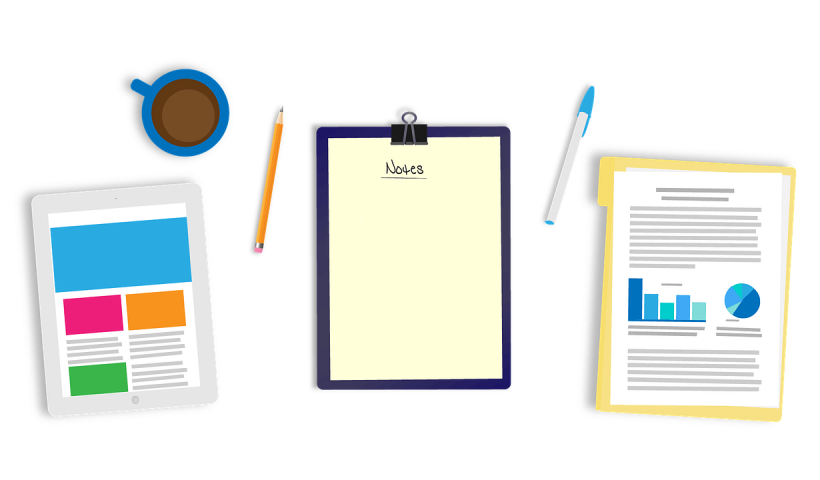8 Bookkeeping Tips For Your Business

Trying to grow your business and juggling million things at the same time? We bet bookkeeping is one of them. Piles of invoices, receipts, bank statements. You know you have to do it but the question is How? How can you manage your bookkeeping, make sure everything is correct and not go crazy at the same time? Here’s a few tips for you.
Keep Personal And Business Banking Separate
This rule applies especially to self-employed and also partnerships as there aren’t any laws saying you have to keep your private and business money separately. This is because these types of businesses don’t involve setting up a separate legal entity. If you’re self-employed, you and your business are basically a one body. As this can seem very convenient, it poses certain risks. Mixing your private and business money makes it difficult to monitor your business performance and grow it. However, we’ve seen this within limited companies too where business and personal funds are regularly mixed.
Businesses are also more vulnerable to fraudulent activities as very often there are more transactions within a business or more people involved in cash management. If you keep your personal and business banking together, it makes it difficult to keep an eye on your transactions. Also, your bookkeeping becomes a nightmare. Going through all the bank statements to identify what relates to your business and what is purely personal adds lots of long and painful hours of work. You could spend these hours on generating more money in your business instead. And if you think that because you have a bookkeeper this doesn’t apply to you, it does. Your fees for bookkeeping services are much higher if a bookkeeper has to spend more time on your books and analysing your bank statements.
Keep Your Business Records In One Place
You don’t have to keep paper copies of your receipts, invoices or statements. If you’re a VAT registered business above the VAT registration threshold, you even have to keep digital records to comply with Making Tax Digital. But if MTD doesn’t apply to you yet, make sure your business records are at least organised and in one place.
Having some copies in a paper format somewhere in a shoe box, some saved in your inbox and some somewhere on your laptop is going to make your bookkeeping a really painful task. You will need you business records at some point. It will be either to do your self-assessment tax return, a corporation tax return, limited company annual accounts or to analyse some trends within your business. No matter what your reason will be, you will want to find what you need quickly.
Our advice is to have everything in one place, so you don’t run around your office or your house trying to desperately find something. And who knows, maybe your dog got there first anyway, but we doubt it was to do your bookkeeping for you.
Use Accounting Software
This can streamline your bookkeeping processes in ways you wouldn’t even imagine. Accounting software can be really sophisticated. It can have lots of amazing features, like live bank feeds, recurring transactions, inventory modules, receipts analysis (yes it can read your paperwork), apps you can use anywhere and much more. But it can also be incredibly helpful to manage bookkeeping needs of a simple and small business. You can, for example, link your business bank account to it to make recording your business transactions a breeze. Accounting software usually have different pricing plans to suit your business needs and you can change to a bigger plan or go back to a smaller one if your bookkeeping needs change.
Get Your Bookkeeping On Auto Pilot
This can be done if you implement accounting software into your business, for example, Xero accounting software. If you have bookkeeping tasks in your business that you repeat regularly, automate them in your software instead. The examples of repetitive tasks can be
- raising sales invoices,
- emailing sales invoices to your customers,
- sending reminders about outstanding payments
- emailing your receipt and invoices to accounting software using email rules
- bank rules used for recurring transactions on your bank statements
- journals for accruals and prepayments (it’s best to have them set up by an experienced bookkeeper)
It’s just a short list of many possibilities.
We are Xero accounting software experts. If you need help with implementing accounting software in your business and automating certain bookkeeping processes, arrange a bookkeeping consultation with us. We’ll be happy to help you.
Use Software Integrations

While we’re talking about accounting software, we have to mention integrations as they can really help streamline your bookkeeping. Your accounting software may not be the only software you use in your business. If you use other systems, for example, for managing your inventory, storing your receipts and paperwork, managing employees’ expense claims, it’s worth researching if they can be integrated with your accounting and bookkeeping software. This can save you hours of manual work and also once set up correctly they usually minimise bookkeeping errors.
Do Regular Bank Reconciliations
Check your bank statements regularly. The reason is you will spot fraudulent activities very quickly and save your business from losing more money but you will also be sure you include all your income and expenses in your tax returns. Claiming all allowable expenses reduces your tax bill. Sometimes we don’t have receipts for everything, so it’s easy to miss things. If you have accounting software, bank reconciliations are much easier especially if you have live bank feeds. Live bank feeds will also help your bookkeeper as they will be able to do your bookkeeping and bank reconciliations on a more regular basis.
Do Your Bookkeeping Regularly
Even if you have the fancies accounting software and amazing structure for storing your business records, your bookkeeping can still be a bit of a nightmare if you don’t do it regularly. It doesn’t necessary mean doing it every week. It can be every month or even every quarter. The frequency will depend on the volume of your transactions and also on how often you want to analyse your business performance. The more things happening in your business, the more frequently you should do your bookkeeping or have a more frequent arrangement with your bookkeeper. If you have a bookkeeper, have a chat with them to help you establish what will be best for you.
Outsource Bookkeeping To A Professional Bookkeeper
Are you overwhelmed with your bookkeeping? Too much happening in your business? Your business is already too big? Or maybe you’re simply not very good at bookkeeping or find it boring? It’s time to outsource your bookkeeping needs to a professional bookkeeper. They will not only free up your time, but they will make sure you comply with the law and the regulations. Do you know there are strict rules for what business records you need to keep to be able to claim your VAT? A professional bookkeeper will have this knowledge and will help you keep your business safe.
If your business is looking for a professional bookkeeping support, contact our friendly bookkeepers from our Oxford bookkeeping office and discuss your individual needs.

Your Accountant in Oxford
Oxford Office
Joanna Bookkeeping
The Wheelhouse Angel Court
First Floor, Angel Court
81 St Clements St
Oxford
OX4 1AW
Connect
joanna@joannabookkeeping.co.uk
01865 591952





